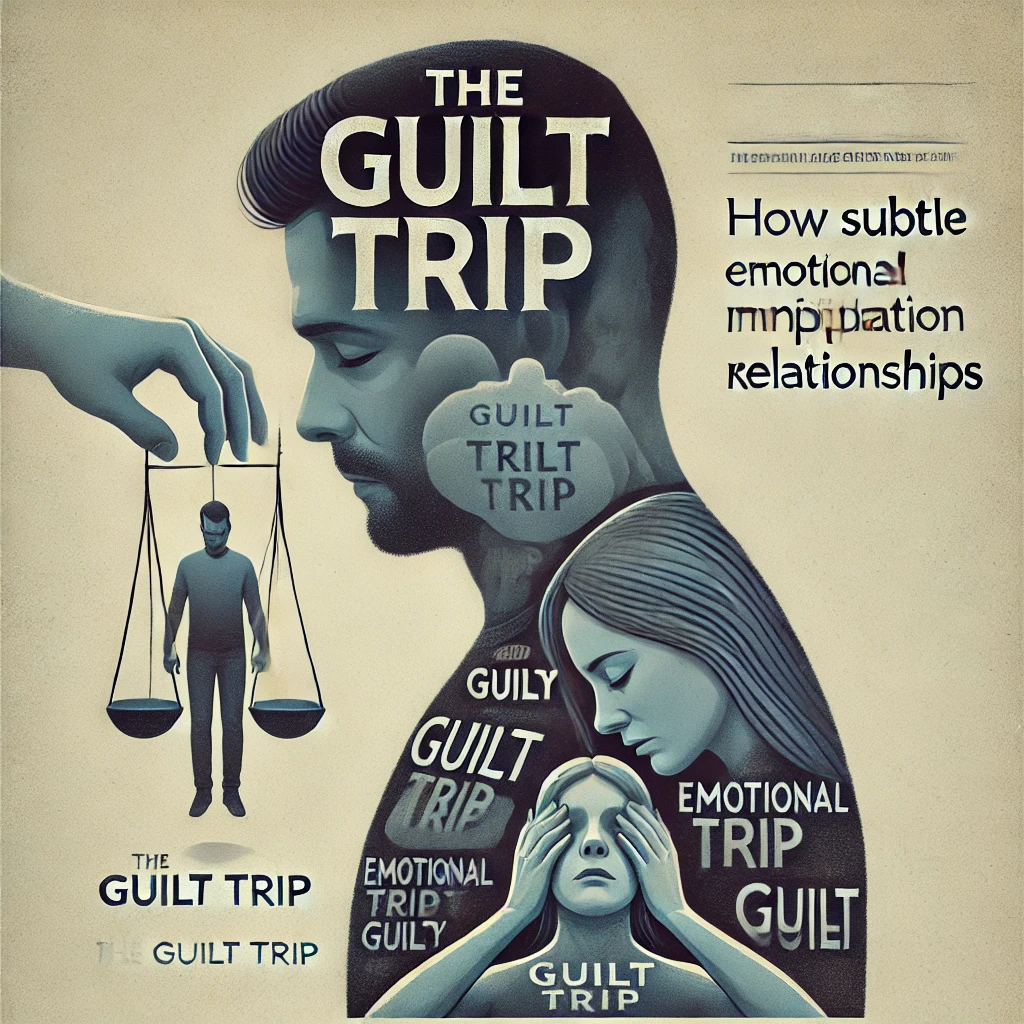We’ve all been there—feeling a twinge of guilt over something small, whether it’s forgetting a chore or not spending enough time with our partner. But what happens when guilt is used as a tool to manipulate emotions and control behavior in a relationship? This is the core of what we call the guilt trip—a subtle yet powerful form of emotional manipulation that can have significant impacts on how partners interact and make decisions.
In “Mastering Him: The Secret Art of Gentle Control in Relationships”, Chapter 8 explores the controversial tactics of influence, and the guilt trip is front and center. While the guilt trip can be an effective way to steer your partner’s behavior, it’s a fine line to walk. Done ethically, it can bring attention to unmet needs. But when misused, it can create toxic dynamics, leaving your partner feeling manipulated and resentful.
In this blog post, we’re going to take an in-depth look at the guilt trip—how it works, why it’s effective, and how to recognize it in your own relationship. By the end, you’ll understand the mechanics behind this emotional tactic, and we’ll offer some examples of how it shows up in everyday life. Finally, we’ll explore whether there’s ever an ethical way to use this strategy, and if so, how to navigate that complex territory.
What Is a Guilt Trip?
A guilt trip is an emotional manipulation technique where someone induces guilt in another person to get them to act in a certain way. It works by making the target feel responsible for something they didn’t do, or by exaggerating their failure to meet expectations. The goal is to elicit a specific response—usually an apology, a favor, or a change in behavior—by making the person feel guilty or ashamed.
Guilt trips are subtle in nature. They don’t come in the form of direct requests but instead rely on emotionally charged statements or actions designed to make the other person feel bad. In relationships, guilt trips can take many forms, from “Why don’t you ever think about me?” to “After everything I’ve done for you, this is how you repay me?”
Why Does the Guilt Trip Work?
The guilt trip is effective because guilt is a powerful emotion. Most people don’t like to feel as though they’ve wronged someone they care about, and they’ll often go out of their way to repair the relationship—even if they haven’t actually done anything wrong.
The guilt trip taps into our desire to maintain harmony in relationships. When we feel guilty, we want to make things right. This makes us more likely to apologize, offer favors, or change our behavior to relieve the guilt and restore balance. For the person using the guilt trip, it’s an easy way to get what they want without directly asking for it.
Real-Life Examples of the Guilt Trip in Relationships
Let’s explore some common, real-life scenarios where guilt trips might show up in a relationship. These examples will help you recognize how guilt trips work and what they look like in day-to-day interactions.
Example 1: The Guilt-Laden Favor
Your partner asks for a favor—perhaps picking up their dry cleaning or running an errand—and you genuinely can’t do it because you’re busy or tired. Instead of accepting that you can’t help, they respond with a guilt trip.
Guilt Trip in Action:
They might say, “I can’t believe you won’t help me out, especially after I’ve done so much for you recently. I would never say no if you needed help.” The implication here is that you’re being ungrateful or inconsiderate, even though your refusal has nothing to do with being unwilling to help.
Why It Works:
By framing the request in terms of how much they’ve done for you, your partner triggers feelings of guilt, making you feel as though you owe them. As a result, you might end up running the errand or doing the favor just to ease the guilt, even if you originally had a valid reason for saying no.
Example 2: The Emotional Withdrawal
In this scenario, your partner uses emotional withdrawal as a form of punishment, indirectly making you feel guilty for something you may not even be aware of.
Guilt Trip in Action:
Your partner becomes distant or cold after you didn’t agree to their suggestion—like not wanting to attend a social event they were looking forward to. When you ask what’s wrong, they say, “Nothing,” but their body language and attitude suggest otherwise. You’re left feeling like you’ve disappointed them, and the emotional distance serves as a reminder of your failure to meet their expectations.
Why It Works:
Emotional withdrawal makes you feel uncomfortable, and the guilt over causing this shift in mood might lead you to change your mind or do something to make them happy again. The guilt trip here is subtle, but effective in getting you to reconsider your stance.
Example 3: The Sacrifice Guilt Trip
This version of the guilt trip involves your partner reminding you of all the sacrifices they’ve made for you whenever they want something in return. It’s a classic form of emotional leverage.
Guilt Trip in Action:
Let’s say you’re debating whether to make a significant decision, like moving to a new city for a job opportunity. Your partner says, “I’ve given up so much for you and now you’re thinking about doing this without even considering how much I’ve already sacrificed? How is that fair?” The focus shifts from your decision to how much your partner has already done for the relationship, making you feel guilty for not prioritizing them.
Why It Works:
By highlighting their sacrifices, your partner makes you feel as though you owe them something. The guilt triggered by these reminders of past sacrifices can lead you to make decisions that prioritize their feelings over your own needs or desires.
Is the Guilt Trip Always Negative?
Here’s where things get tricky. Is there ever a situation where a guilt trip could be justified or even helpful? Chapter 8 of “Mastering Him” delves into this gray area, exploring whether the guilt trip can ever be used ethically in relationships.
In some cases, guilt can serve as a wake-up call. If one partner has been neglecting their responsibilities or consistently putting their own needs above the relationship, using a guilt trip might draw attention to the imbalance. However, the key is intent. If the goal is to foster mutual understanding and improve the relationship, the guilt trip might be framed in a way that leads to positive change.
Example of a Positive Guilt Trip:
Your partner might say, “I’ve noticed that we haven’t spent much time together lately, and it’s starting to make me feel like I’m not a priority. Can we talk about how to balance our schedules better?” Here, guilt is being used not to control, but to highlight a genuine concern, sparking a conversation about how to improve the relationship.
The problem arises when guilt is used as a weapon, a way to manipulate behavior without any regard for the other person’s feelings or needs. In these cases, the guilt trip can be incredibly damaging, leading to resentment and emotional exhaustion over time.
How to Recognize Guilt Trips in Your Relationship
If you’re wondering whether guilt trips are playing a role in your relationship, here are a few red flags to watch out for:
- Frequent Reminders of Sacrifice: If your partner constantly brings up all the things they’ve done for you as a way to get what they want, it’s likely a guilt trip.
- Emotional Withdrawal: If your partner becomes distant or cold whenever you don’t agree with them, leaving you feeling guilty or uncertain, this could be a form of emotional manipulation.
- Overreacting to Small Issues: If your partner blows small issues out of proportion to make you feel bad, this is a clear sign of a guilt trip.
How to Respond to Guilt Trips
If you notice that your partner is using guilt trips to influence you, the first step is to recognize it for what it is. Once you understand that guilt is being used as a form of control, you can respond calmly and assertively.
- Acknowledge the feeling: “I see that you’re upset because I can’t do this right now.”
- Set boundaries: “I understand that you feel disappointed, but I’m not comfortable making this decision based on guilt.”
- Redirect the conversation: “Let’s talk about why this is so important to you, but I don’t want guilt to be the reason for my decision.”
Q&A:
- What is a guilt trip in relationships, and how does it work?
A guilt trip is a form of emotional manipulation where one person makes the other feel guilty to control their behavior or decisions. It often involves subtle comments or actions that evoke feelings of responsibility or remorse in the target. - How do I know if I’m being guilt-tripped by my partner?
Signs include frequent reminders of sacrifices made for you, emotional withdrawal when you don’t agree, or exaggerated responses to minor issues that leave you feeling guilty. - Why do people use guilt trips in relationships?
People use guilt trips to influence their partner’s decisions without direct confrontation. It can stem from a desire to feel validated or to ensure needs are met indirectly. - What are some common examples of guilt-tripping in relationships?
Examples include reminding a partner of past favors, using silence or withdrawal after a disagreement, or saying things like “After all I’ve done for you, this is how you repay me?” - Is it ever okay to use guilt to influence someone in a relationship?
Using guilt ethically depends on intent. If it’s to highlight a genuine concern rather than manipulate, it can be constructive. However, overuse often leads to resentment and a toxic dynamic. - How can I address guilt trips in my relationship effectively?
Recognize the tactic, express how it makes you feel, set boundaries, and shift the focus to open dialogue about both partners’ needs. - What are the effects of frequent guilt trips on a relationship?
Over time, guilt trips can lead to resentment, low self-esteem, and communication issues, ultimately weakening trust and intimacy between partners. - How do I recognize if I’m unintentionally guilt-tripping my partner?
Reflect on whether you use emotional withdrawal, reminders of sacrifices, or imply they’ve failed to meet your expectations frequently to influence their choices. - Can guilt trips be a form of emotional abuse in relationships?
Yes, when used excessively or manipulatively, guilt trips can be emotionally abusive, causing feelings of inadequacy or guilt, affecting the partner’s mental well-being. - How do I respond if my partner accuses me of guilt-tripping?
Listen openly, understand their perspective, and discuss other ways to express needs without inducing guilt. It can lead to healthier communication and mutual understanding.
Ready to Master the Art of Influence in Your Relationship?
If you’re ready to dive deeper into the psychology of influence and understand how to use powerful techniques like the guilt trip responsibly, then “Mastering Him: The Secret Art of Gentle Control in Relationships” is the guide you need. In Chapter 8, you’ll learn how to navigate the complex dynamics of emotional influence and explore whether tactics like the guilt trip can be used ethically in relationships.
This isn’t just about manipulation—it’s about understanding how subtle forms of influence shape your relationship and learning how to wield that power for good. Get your copy today and start mastering the art of gentle control in your relationship—because understanding influence is the key to creating lasting connection and harmony.
Read more about the book: https://developmentpill.com/mastering-him-the-secret-art-of-gentle-control-in-relationships-a-guide-to-influence-hell-never-see-coming/
Book Link: https://www.amazon.com/dp/B0DKKGLZQ9
Book Link UK: https://www.amazon.co.uk/dp/B0DKKGLZQ9
You can find book Links for other regions in this post page: https://developmentpill.com/mastering-him-the-secret-art-of-gentle-control-in-relationships-a-guide-to-influence-hell-never-see-coming/



